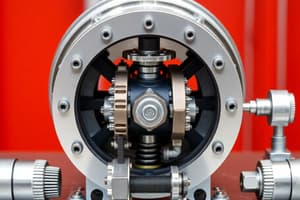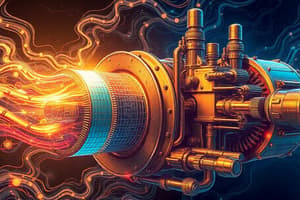Podcast
Questions and Answers
What is the main focus of the Second Law of Thermodynamics?
What is the main focus of the Second Law of Thermodynamics?
- Energy conservation
- Phase change
- Entropy increase (correct)
- Temperature equilibrium
In thermodynamics, what is work defined as?
In thermodynamics, what is work defined as?
- Force applied over a distance (correct)
- Energy transfer due to a temperature difference
- Energy required to change phase
- Change in volume at constant pressure
What is the principle behind a heat pump?
What is the principle behind a heat pump?
- To transfer heat from a low-temperature source to a high-temperature sink (correct)
- To transfer heat from a high-temperature source to a low-temperature sink
- To decrease the temperature of a system
- To increase the temperature of a system
Which term refers to the energy required to raise the temperature of a unit mass by one degree?
Which term refers to the energy required to raise the temperature of a unit mass by one degree?
What does the Second Law of Thermodynamics state about entropy in an isolated system?
What does the Second Law of Thermodynamics state about entropy in an isolated system?
Which law is used to define temperature?
Which law is used to define temperature?
What is a thermodynamic cycle?
What is a thermodynamic cycle?
In an isobaric process, what happens to the pressure?
In an isobaric process, what happens to the pressure?
Which process involves a change in both temperature and pressure?
Which process involves a change in both temperature and pressure?
Which term describes the heat required to change the phase of a unit mass of a substance?
Which term describes the heat required to change the phase of a unit mass of a substance?
What is the significance of the Third Law of Thermodynamics?
What is the significance of the Third Law of Thermodynamics?
What is internal energy?
What is internal energy?
In an isothermal process, what remains constant?
In an isothermal process, what remains constant?
What is the efficiency of a heat engine defined as?
What is the efficiency of a heat engine defined as?
What does the First Law of Thermodynamics relate to?
What does the First Law of Thermodynamics relate to?
Which process is characterized by no heat transfer with the surroundings?
Which process is characterized by no heat transfer with the surroundings?
In a thermodynamic system, what is the term for energy transferred by a force acting through a distance?
In a thermodynamic system, what is the term for energy transferred by a force acting through a distance?
Which law of thermodynamics is also known as the Law of Energy Conservation?
Which law of thermodynamics is also known as the Law of Energy Conservation?
Which type of equilibrium ensures that there are no unbalanced forces within the system?
Which type of equilibrium ensures that there are no unbalanced forces within the system?
In a heat engine, what is the work output equal to?
In a heat engine, what is the work output equal to?
Flashcards
Control Volume
Control Volume
A fixed space where mass and energy can cross boundaries.
State of a System
State of a System
Properties defining a system at a specific moment.
Extensive vs. Intensive Properties
Extensive vs. Intensive Properties
Properties that depend on the amount of matter (extensive) vs. those that don't (intensive).
Thermodynamic Cycle
Thermodynamic Cycle
Signup and view all the flashcards
Isobaric Process
Isobaric Process
Signup and view all the flashcards
Isochoric Process
Isochoric Process
Signup and view all the flashcards
Adiabatic Process
Adiabatic Process
Signup and view all the flashcards
Thermodynamic Equilibrium
Thermodynamic Equilibrium
Signup and view all the flashcards
Zeroth Law of Thermodynamics
Zeroth Law of Thermodynamics
Signup and view all the flashcards
Work (in Thermodynamics)
Work (in Thermodynamics)
Signup and view all the flashcards
Heat
Heat
Signup and view all the flashcards
First Law of Thermodynamics
First Law of Thermodynamics
Signup and view all the flashcards
Internal Energy
Internal Energy
Signup and view all the flashcards
Specific Heat
Specific Heat
Signup and view all the flashcards
Carnot Cycle
Carnot Cycle
Signup and view all the flashcards
Heat Engine
Heat Engine
Signup and view all the flashcards
Efficiency of a Heat Engine
Efficiency of a Heat Engine
Signup and view all the flashcards
Entropy
Entropy
Signup and view all the flashcards
Isolated System
Isolated System
Signup and view all the flashcards
Latent Heat
Latent Heat
Signup and view all the flashcards
Study Notes
Thermodynamic Concepts
- Control volume: A fixed space where mass and energy can cross boundaries.
- State of a system: Defined by its properties at a specific moment.
- Extensive vs. Intensive Properties: Extensive properties depend on the amount of matter (e.g., mass), while intensive properties do not (e.g., density).
- Thermodynamic cycle: A series of processes that returns a system to its original state.
- Isobaric Process: Occurs at constant pressure; work done equals pressure times change in volume.
- Isochoric Process: Volume remains constant.
- Adiabatic Process: No heat exchange with surroundings.
- Thermodynamic equilibrium: All macroscopic changes cease, with no energy transfer.
- Zeroth Law: Establishes a basis for measuring temperature.
Energy Interactions
- Work in thermodynamics: Energy transferred by a force over a distance.
- Heat: Energy transfer due to a temperature difference.
- First Law of Thermodynamics: Energy cannot be created or destroyed, only transformed.
- Internal energy: Sum of all energy forms in a system; changes due to heat transfer and work done.
Processes and Laws
- Specific heat: Amount of heat needed to change a unit mass's temperature by one degree.
- Carnot cycle: Idealized cycle for heat engines, defines maximum efficiency dependent on temperature differences.
- Heat engine: Converts heat into work; work output equals heat input minus heat rejected.
- Heat pump: Transfers heat from a low-temperature source to a high-temperature sink.
Properties and Measurements
- Enthalpy: Total heat content, relevant for processes involving heat transfer and phase changes.
- Efficiency of a heat engine: Ratio of work output to heat input.
- Entropy: Measure of disorder within a system; reflects the Second Law of Thermodynamics stating entropy in isolated systems tends to increase.
Practical Applications and Examples
- Refrigeration cycles: Used in cooling processes, transferring heat from low to high temperature.
- Polytropic processes: Relate pressure and volume with a specific polytropic index, affecting energy interactions.
- Ideal gas behavior: Under isothermal conditions, internal energy remains constant during expansion or compression.
Fundamental Laws of Thermodynamics
- First Law: Conservation of energy; the change in internal energy equals heat added minus work done.
- Second Law: Entropy of an isolated system always increases, establishing the direction of energy transformation.
- Third Law: Entropy of a perfect crystal at absolute zero is zero.
- Zeroth Law: Foundations for thermal equilibrium.
Understanding System Types
- Isolated system: No mass or energy exchange with surroundings.
- Closed system: Exchanges energy but not mass.
- Open system: Exchanges both mass and energy.
Additional Key Terms
- Latent heat: Heat required to change the phase of a unit mass without changing its temperature.
- Work-energy principle: Defines the relationship between work done and changes in kinetic or potential energy in mechanical contexts.
These notes encapsulate critical concepts, processes, and definitions relevant to the fundamental principles of thermodynamics covered in the specified sections.### Thermodynamics Fundamentals
- Latent Heat: The heat required to change the phase of a unit mass of a substance without changing its temperature.
- Specific Heat: The amount of heat required to raise the temperature of a unit mass by one degree.
- Heat Capacity: The total heat required to raise the temperature of a substance by one degree, depending on mass.
- Enthalpy: The total heat content of a system; includes internal energy and energy required to make space for the pressure exerted by the system.
Laws of Thermodynamics
- First Law of Thermodynamics: Known as the Law of Energy Conservation; states energy can neither be created nor destroyed, only converted from one form to another. Relates heat and work.
- Second Law of Thermodynamics: Establishes that the entropy of an isolated system always increases, indicating the direction of energy transfer and that energy conversions are not 100% efficient.
- Third Law of Thermodynamics: States the entropy of a perfect crystal approaches zero as the temperature approaches absolute zero. This law helps define the absolute scale of entropy.
- Zeroth Law of Thermodynamics: Establishes the concept of temperature and enables the definition of thermal equilibrium.
Thermodynamic Processes
- Isothermal Process: A process occurring at a constant temperature; internal energy remains constant.
- Adiabatic Process: A process characterized by no heat transfer with the surroundings; internal energy changes due to work done on or by the system.
- Isobaric Process: A process occurring at constant pressure.
- Isochoric Process: A process occurring at constant volume; no work is done since volume does not change.
Energy and Work
- Work: Energy transferred by a force acting through a distance; expressed in terms of force times distance.
- Internal Energy: The sum of all forms of energy within a system, including kinetic and potential energy.
- Efficiency of Heat Engine: Defined as the ratio of work output to heat input; influenced by the temperature difference between heat reservoirs.
System Equilibrium
- Mechanical Equilibrium: Condition where there are no unbalanced forces acting on a system, ensuring it remains at rest.
- Thermal Equilibrium: Condition where a system's temperature remains constant over time; no net heat transfer occurs.
- Chemical Equilibrium: Occurs when the rates of forward and reverse reactions in a system are equal, resulting in no net change in concentration of reactants and products.
Important Properties
- Extensive Property: Depends on the amount of matter present, such as mass or volume.
- Intensive Property: Independent of the amount of matter, such as temperature or density.
- Entropy: A measure of disorder within a system; increases in an isolated system according to the Second Law.
Applications and Cycles
- Carnot Cycle: An idealized thermodynamic cycle representing the maximum efficiency of a heat engine, dependent purely on the temperatures of the hot and cold reservoirs.
- Refrigeration Cycle: A process used to transfer heat from a low temperature to a high temperature, effectively cooling the lower temperature area.
By understanding these foundational concepts, students will be equipped to tackle various topics in thermodynamics and their applications in engineering and physical science.
Studying That Suits You
Use AI to generate personalized quizzes and flashcards to suit your learning preferences.




